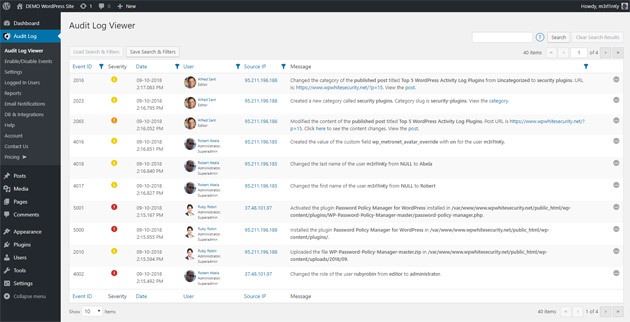How to Use an Audit Log to Practice WordPress Forensics
User accountability, improved security & forensics, adhering to compliance and easy troubleshooting are just a few of the benefits of keeping an activity log on your WordPress site.

WordPress is a multi-user Content Management System (CMS) and can also be setup as a multisite network. In a multisite network you can have multiple child sites and multiple users managed centrally, from one multisite network dashboard.
These key features are what make WordPress so popular, however they can also create a lot of problems. The more users you have on your site or network, the greater the chance for mistakes and security issues.
However, with an audit trail (more commonly known as activity log or audit log) you cut down on the risks of permitting access to multiple users. Keeping track of the actions people take while logged in to your WordPress site provides a complete picture that can help when you’re confronted with mistakes, security attacks, and even a variety of errors.
In this article, we’ll discuss WordPress’ nature as a multi-user platform, and explain how you can use the audit logs to better manage your site’s users and security. Then we’ll explore four key functions an audit log can tackle on your site, and explain how you can implement them using an activity log plugin. Let’s dive in!
The Need for an Activity Log on Your WordPress Site
Multiple users can collaborate on a single WordPress site, taking on different roles with varying levels of access and responsibility. Some may only be able to write posts, others can also edit and publish content, and high-level users can make critical changes to the site, such as installing plugins and changing themes.
The challenge with sites created using this kind of platform is that there’s a lot of activity coming from several sources. With more than one user, it can be hard to keep track of who is doing what on your WordPress site, especially because WordPress doesn’t have an activity log out of the box.
With WordPress growing in popularity among large, high-traffic sites, audit logs are becoming more crucial. The ability to keep a record of everything that happens on these sites and be able to trace back changes, in order to tighten security and to make troubleshooting faster and easier, is vital to their continued success.
Fortunately, you can add the activity log functionality to your site by using an activity log plugin for WordPress. Let’s talk a little more about how you can benefit from these solutions.
An Introduction to Audit Logs
An effective audit log provides a lot of useful information regarding the activity that occurs on your WordPress site. With that being said, the huge volume of data a log can produce may feel intimidating at first, especially since it will constantly be updated with new events:

Despite the added task of regularly checking your site’s activity record, an audit log is invaluable for a variety of reasons, most of which are related to security. Audit logs enable you to check up on your users, correct mistakes, and comply with data privacy regulations. Additionally, logs play a role in preventing, stopping, and repairing damage after hacks, as well as streamlining the troubleshooting process. We’ll discuss each of these benefits in more detail soon.
4 Key Benefits of Having a WordPress Activity Log
An audit log on your site helps you solve several key issues that are likely to come up at some point when managing a WordPress site, as we highlight in the rest of this article.
Maintain Accountability Among Your Site’s Users
Without an activity log, there’s no way to know who is doing what on your WordPress site. While ideally all of your users would own up to their mistakes and only make changes on your site with good intentions, that isn’t always the case. Therefore, having a way to hold people accountable for their actions can prove very useful.
While permitting multiple users access to your site makes a lot of things possible, it also creates some potential problems. People make mistakes, and the more users you have on your site, the more likely it is that accidents will occur. For example, a user may unintentionally delete sensitive business data, leak personal records, or upload malicious files. Some may not want to admit their errors, leaving you in the dark as to how the problem started.
Other times people may even damage your site intentionally. For instance, it’s not unheard of for high-ranking employees to log in and wreak havoc on a business website after being fired..
No matter the cause, it’s helpful to know what was changed on your site at all times, so you have a starting point when something needs to be fixed or traced back. An activity log will be able to tell you who carried out each action on your site, when and from where. This enables you to approach users who made a mistake, in order to get needed information.
Adhere to Strict Compliance Regulations & Requirements
WordPress is used by any type of business and often it is used to store sensitive data. So when it comes to business sites that handle sensitive data, an audit log is mandatory.
In fact the majority of healthcare, eCommerce, finance, software and hospitality compliance regulations legally oblige businesses to keep a record of everything that happens on their sites. They are also required to create regular reports to analyse and keep track of who is accessing the data or possibly trying to access it.
Such regulations are mandatory because an activity log ensures that access to your users and customers’ sensitive data is being monitored for suspicious activity that could lead to breaches and leaks. In the event of a breach, your log can point you towards the culprit.
Improve Security on Your WordPress Site & Thwart Attacks
The activity log on a WordPress site also plays a major role in its security. Activity logs allow you to identify possible attacks before they happen, identify weaknesses on your site and do the forensic work.
Identifying possible attacks: Audit logs are the core of a WordPress intrusion detection system (IDS). The use of IDS on a WordPress site is crucial because it alerts you before an attack happens, or during its early stages. This gives you the opportunity to evade the attack. For example from the logs you spot someone who is scanning your website for vulnerabilities, launching a brute force attack, or if a user account is hijacked.
Identifying weaknesses: What’s more, the information in your WordPress audit log can often be used to find unknown weaknesses. If you notice that an account with a specific role is able to access data that it should not be accessing, you can work to improve the security of that element. The same applies to malicious activity. Preventing future attacks by strengthening problematic areas of your site will keep it and your sensitive information safer down the line.
Forensics and recovering from a hack attack: Recovering from a hack attack on your WordPress sites can be a long and difficult process. Two key steps you’ll need to take are repairing the damage done during the attack, and conducting a forensic analysis to find out how the attack happened (in order to prevent future security breaches). Audit logs are crucial in forensics, because they are often the only source of information you’ll have.
After an attack, you can also use the data collected in the activity log to find out which parts of your site were impacted and damaged, making it easier to know what you need to fix. This will help you get everything back up and running quickly.
Stop Guessing, Ease Troubleshooting
Errors on a WordPress site can occur due to updates, or because of compatibility issues between plugins and themes, or because of a setting change. If you’ve experienced an error or a change and can’t find an explanation, an activity log can help you locate the answer and ease the troubleshooting process, just as with the forensics process we discussed earlier.
Trying to solve a technical problem without activity logs is like trying to find a needle in a haystack! Without a WordPress audit log, this process can take up a lot of time. It involves a lot of guesswork, such as uninstalling one plugin at a time, or changing a setting to see if that solves the error.
With an audit log, on the other hand, you can easily see what the most recently installed and updated plugins and themes are, and what site settings were most recently changed. By checking to see what activities took place just before the error occurred, you can pinpoint the source of the problem quickly.
Better Manage Your WordPress Site with Activity Logs
Managing a multi-user CMS like WordPress can be difficult. What’s more, juggling multiple users provides its own unique set of challenges. With an audit log, you can automatically track the activity on your site, eliminating the question of who did what and when. If you have more than one user, and especially if you run a business, logs are no longer a commodity but a must.
As we’ve seen, you can implement an activity log with a plugin such as WP Security Audit Log, in order to tackle four strategies:
- Maintain accountability among your site’s users
- Achieve compliance with privacy regulation requirements
- Improve the security on your site and forensics
- Tackle troubleshooting with more information




